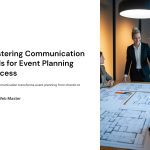 In the fast-paced world of event planning, mastering communication skills is a game-changer. Whether you’re liaising with performers, negotiating with vendors, or handling client expectations, strong communication is key to seamless event execution. This article explores the vital communication techniques that professionals in the event planning industry must develop to thrive in their careers.
In the fast-paced world of event planning, mastering communication skills is a game-changer. Whether you’re liaising with performers, negotiating with vendors, or handling client expectations, strong communication is key to seamless event execution. This article explores the vital communication techniques that professionals in the event planning industry must develop to thrive in their careers.

Understanding the Role of Communication in Event Planning
Effective communication is the foundation of every successful event. From pre-event planning to post-event follow-ups, clear and concise communication ensures that all stakeholders are aligned. Event planners must be adept at both verbal and written communication to convey instructions, manage expectations, and resolve conflicts efficiently.
Additionally, non-verbal communication plays a crucial role in negotiations and on-site management. Understanding body language, maintaining a confident posture, and using active listening techniques can enhance interpersonal interactions and foster trust among team members and clients.

Essential Verbal Communication Skills for Event Planners
Strong verbal communication skills help event planners articulate their vision, provide clear instructions, and address concerns effectively. Some key verbal communication techniques include:
- Active Listening: Paying close attention to what others are saying and responding thoughtfully.
- Clarity and Conciseness: Avoiding ambiguity and ensuring messages are easy to understand.
- Persuasive Speaking: Convincing stakeholders and clients to align with your event strategies.
- Conflict Resolution: Handling misunderstandings and disputes professionally.
Practicing these verbal skills enhances collaboration and minimizes miscommunication, ultimately leading to more successful events.

The Power of Written Communication in Event Management
In the digital era, written communication is just as important as verbal communication. Event planners frequently engage in email correspondence, proposal writing, and contract negotiations. To communicate effectively in writing, consider the following:
- Professional Tone: Maintaining a respectful and authoritative voice.
- Precision and Detail: Providing all necessary information without unnecessary complexity.
- Grammar and Formatting: Ensuring clarity through proper grammar and structured formatting.
Clear written communication fosters professionalism and prevents misunderstandings, ensuring that all parties remain informed and aligned throughout the event planning process.

Non-Verbal Communication Strategies for Event Planners
Non-verbal cues can significantly impact interactions in the event planning industry. Mastering non-verbal communication helps build rapport and enhances teamwork. Key strategies include:
- Maintaining Eye Contact: Demonstrates confidence and attentiveness.
- Gestures and Body Language: Enhancing verbal communication with appropriate gestures.
- Mirroring Techniques: Subtly mimicking a speaker’s body language to create rapport.
A strong grasp of non-verbal communication aids in negotiations and crisis management, ensuring smoother interactions during high-pressure situations.

Crisis Communication and Problem-Solving in Event Planning
Events rarely go exactly as planned, making crisis communication a vital skill. When unexpected issues arise, effective communication helps to de-escalate situations and find quick solutions.
- Staying Calm Under Pressure: Communicating with confidence despite challenges.
- Providing Clear and Timely Updates: Keeping stakeholders informed during crises.
- Apologizing and Taking Responsibility When Needed: Maintaining professionalism in difficult conversations.
By mastering crisis communication, event planners can turn potential disasters into opportunities for excellent service and client satisfaction.

Final Thoughts: Continuous Improvement in Communication Skills
Communication skills are not static; they require continuous improvement. Event planners should invest time in training, attending workshops, and practicing real-life scenarios to enhance their abilities. Networking and collaborating with industry professionals also provide valuable insights into effective communication strategies.
Ultimately, excelling in communication empowers event planners to build strong relationships, execute successful events, and establish a stellar reputation in the industry.
*Capturing unauthorized images is prohibited*



